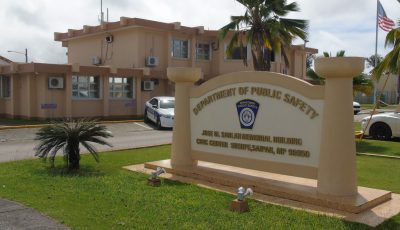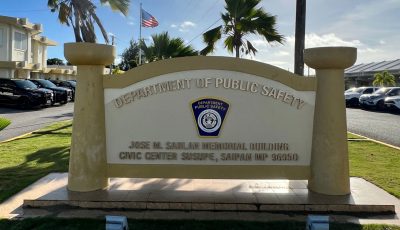‘DFW officers can’t probe drug cases, no authority to impound cars’
Conservation officers of the Division of Fish and Wildlife cannot investigate drug cases and have no legal authority to impound a vehicle, according to Superior Court Associate Judge Joseph N. Camacho.
Camacho said the CNMI Legislature limited the powers of DFW officers and what they can investigate.
The judge said DFW conservation officers can assist Department of Public Safety police officers but do not have general police powers like DPS officers.
Camacho discussed DFW’s authority in his order on Friday that granted Angelo Ignacio C. Villagomez’s motion to suppress the contents of his black pouch and any evidence found during a DFW search.
Camacho, however, did not suppress the gill net and fish in the bed of the truck and the receipts and other items in plain view in the cabin of Villagomez’s pickup truck.
DFS officers arrested Villagomez, a fisherman, last Dec. 15 for allegedly fishing using a gill net at a Lau Lau Beach dive spot.
Villagomez, through assistant public defenders Eden Schwartz and Michael Sato, moved to suppress evidence. Assistant attorney general Clayton Graef, as counsel for the government, opposed.
According to court records, DFW conservation officer Erwin Flores testified at a March 25, 2015, hearing about the events on the night of Dec. 15, 2014.
DFW received a call from a concerned citizen, reporting that Villagomez fishes at Lau Lau Beach using a gill net, and selling the fish and using the proceeds to buy methamphetamine or “ice.”
Flores said a special type of permit is required to use a gill net, and the fish caught is typically intended for large community events.
The concerned citizen also reported that Villagomez would bring a .22 rifle with him to Lau Lau Beach.
Flores investigated this tip and did a surveillance operation on Dec. 9, 12, and 15, 2014.
On Dec. 9 and 12, Flores saw Villagomez using the gill net at Lau Lau Beach. On Dec. 15, his third surveillance, Flores, aboard an unmarked DFW vehicle, watched Villagomez finish fishing at Lau Lau Beach and load his equipment into his truck.
As Villagomez was leaving the beach, Flores drove up behind the defendant in an unmarked vehicle, while two marked DFW vehicles stopped the defendant’s truck from behind with a flashlight.
Flores said he saw a gill net with fish in the bed of the truck and then told the defendant he was under arrest and pulled him from the cab of the truck.
Flores advised the defendant of his rights, then the defendant was secured in the back seat of one of the marked DFW vehicles.
After this, Flores inspected the interior of the truck’s cab, where he found receipts from two fish markets, some of which were inside the center’s console. These receipts showed that fish had been sold to these markets, but not how they were caught or by whom.
In addition, Flores found Q-tips, a needle/wire, lighters, and a pipe wrapped in a tissue that appeared to have a controlled substance on it.
In his order, Camacho said unreasonable searches and seizures are prohibited under both the Fourth Amendment of the U.S. Constitution and Article 1, Section 3 of the CNMI Constitution.
Camacho said the Commonwealth Legislature has expressly limited the powers of conservation officers to enforcing violations of the Fish, Game, and Endangered Species Act.
“Although the DFW director may enlist the assistance of DPS officers, this does not necessarily mean that DFW conservation officers may in turn act as DPS officers,” the judge said.
Camacho said Flores was correct in investigating Villagomez for using an illegal gill net but conducting a search of the suspect’s car for controlled substances was beyond the scope of his authority.
Camacho noted that DPS was not involved in this case at all.
The judge noted that although the tip provided indicated that there were controlled substance and firearm elements in this case, Flores did not reach out to DPS for assistance.
Since the gill net and fish were in plain view, Camacho said that Flores had the authority to seize them and this evidence will not be suppressed.
Although the pouch itself was visible within the cabin of the vehicle, Camacho said that opening the pouch to inspect its contents constitutes a separate search.
“Thus, the contents of the pouch must be suppressed,” he said.
Camacho said a conservation officer’s authority is limited solely to conservation issues, and does not extend to drug enforcement.
On impounding vehicles, Camacho said Flores testified that there are no standard impound procedures at DFW.
Camacho said that based on the statute, DFW has no authority to impound any vehicles at all, even if they were involved in violation of the Fish, Game and Endangered Species Act.
“Any evidence obtained during this inventory search must be suppressed, as DFW had no legal authority to impound a vehicle,” he said.
Last month, Camacho suppressed all the statements made by Villagomez while in custody. The judge determined that nothing indicates what exact rights the defendant was advised of, nor is there any testimony indicating that he had acknowledged that he understood these rights.



























